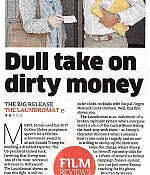|
Simply Streep is your premiere source on Meryl Streep's work on film, television and in the theatre - a career that has won her the praise to be one of the world's greatest working actresses. Created in 1999, we have built an extensive collection to discover Miss Streep's body of work through articles, photos and videos. Enjoy your stay.
|
Celebrating
25 years
of SimplyStreep
|
|
Review: Dull take on dirty money
Metro ·
September 25, 2019
· Written by Larushka Ivan-zadeh
|
Meryl Streep used her 2017 Golden Globes acceptance speech for a lifetime achievement award to attack Donald Trump for mocking a disabled reporter. The US president lashed back, tweeting that Streep was ‘one of the most overrated actresses in Hollywood’. The Laundromat shows us that this fight is still on. Streep is the emotional core of an A-list-packed clutch of stories based around the Panama Papers. Remember them? These were the 11.5 million documents, released in 2016, that exposed well over 200,000 offshore shell ‘companies’ housed by a Panamanian law firm called Mossack Fonseca. Though technically legal, this tax-haven scandal touched everyone from Jackie Chan to David Cameron and several heads of state (including Trump, whose name appeared 3,450 times). ‘So how does it all work, this world of offshore companies?’ asks Ramón Fonseca (Antonio Banderas) as he clinks cocktails with his pal Jürgen Mossack (Gary Oldman). Well, this film shows you.
The Laundromat is an indictment of a broken capitalist system where everyone wants a slice of the cash without letting the buck stop with them — as Streep’s character discovers when a pleasure boat cruise ends in tragedy and no one is willing to stump up the insurance. Come the climax, where Streep (as herself) earnestly calls for a ‘reform of America’s broken campaign finance system’, you can just sense Trump reaching for his phone. Directed by Steven Soderbergh, the starry ensemble here recalls his earlier film, Traffic, but the pace of this polemic is draggy, even at 96 minutes, and all the meta-tricksiness is tiresome. Each vignette is based around money but it’s only one, involving Nonso Anozie negotiating happiness within his family, that pays off.










